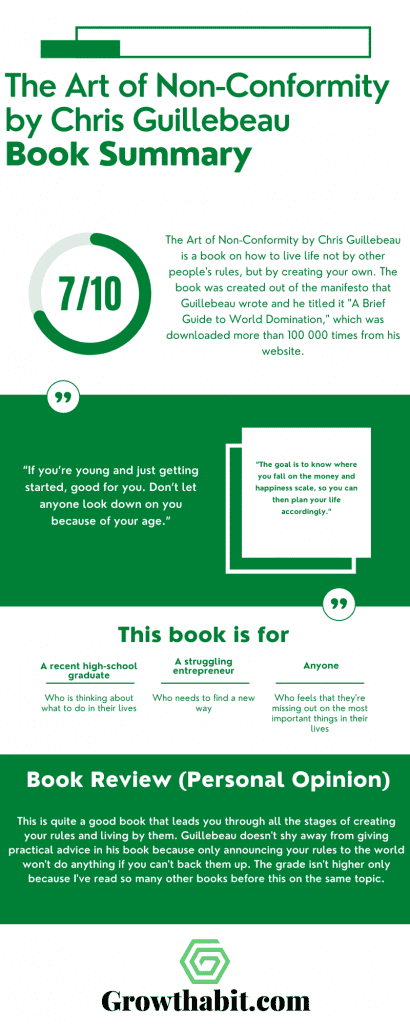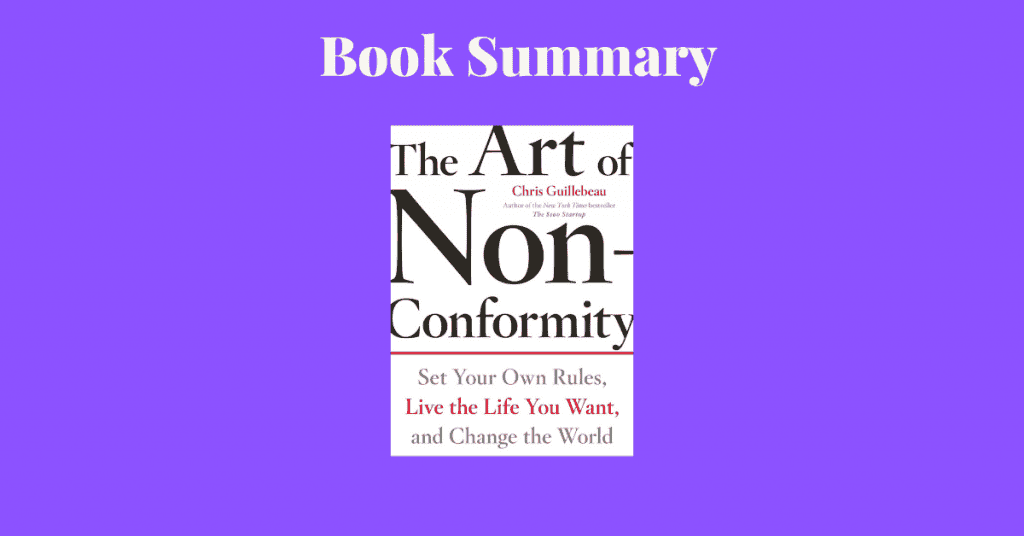The Art of Non-Conformity by Chris Guillebeau is a book on how to live life not by other people’s rules, but by creating your own. The book was created out of the manifesto that Guillebeau wrote and he titled it “A Brief Guide to World Domination,” which was downloaded more than 100 000 times from his website.
Book Title: The Art of Non-Conformity: Set Your Own Rules, Live the Life You Want, and Change the World
Author: Chris Guillebeau
Date of Reading: February 2018
Rating: 7/10
What Is Being Said In Detail:
The Art of Non-Conformity is a fairly straightforward book. It has 11 chapters and three distinct parts of the book.
Part 1- The Remarkable Life
Part 1 talks about the current “rules” in life— how you should live it and what you should do with your life. Guillebeau then flips the script and shows us how most of those rules are set up to give you a disadvantage in life and how you should create your own rules. The chapters in this part are:
- CHAPTER 1 – Sleepwalkers and the Living World
- CHAPTER 2 – Setting the Terms of Your Unconventional Life
- CHAPTER 3 – Smashing Through the Brick Wall of Fear
- CHAPTER 4 – How to Fight Authority and Win
Part 2- Reclaiming Work
Part 2 talks about dealing with the world once you set up your own rules. Since you’re living an unconventional life now, you no longer have the luxury of falling back to convenience when something happens. But the fallback in Guillebeau’s case is his competence and expertise. To live an unconventional life, you need to create skills that you can fall back to. The chapters in this part are:
- CHAPTER 5 – Competence Is Your Security
- CHAPTER 6 – Graduate School vs. the Blogosphere
- CHAPTER 7 – The Power of Your Own Small Army
- CHAPTER 8 – The Personal Finance Journey
Part 3- The Power of Convergence
Part 3 talks about converging points in your life— when you become good at what you do, you start loving it, and you can live off it. Guillebeau also talks about your mission, vision, and leaving a legacy as a marker that you were once born to this world and that you lived. The chapters in this part are:
- CHAPTER 9 – Radical Exclusion and the Quest for Abundance
- CHAPTER 10 – Contrarian Adventures
- CHAPTER 11 – Your Legacy Starts Now
Most Important Keywords, Sentences, Quotes:
PROLOGUE
”If everyone else jumped off a bridge, would you?” The idea is that it’s not good to do something stupid, even if everyone else is doing it. The logic is, Think for yourself instead of following the crowd. It’s not bad advice, even if it’s sometimes used to exert control more than to support independent thinking. But one day, you grow up and suddenly the tables are turned. People start expecting you to behave very much like they do. If you disagree and don’t conform to their expectations, some of them get confused or irritated.It’s almost as if they are asking: “Hey, everyone else is jumping off the bridge. Why aren’t you?”
“The possibilities are unlimited, but it all begins with the deliberate choice to think differently.”
PART I The Remarkable Life
CHAPTER 1 – Sleepwalkers and the Living World
“After working in West Africa for four years as a volunteer aid worker, I returned to the United States to attend graduate school in the fall of 2006. The official story is that I completed a two-year master’s degree in International Studies at the University of Washington. The real story is that I spent $32,000 to learn about motivations.”
“11 WAYS TO BE UNREMARKABLY AVERAGE 1. Accept what people tell you at face value. 2. Don’t question authority. 3. Go to college because you’re supposed to, not because you want to learn something. 4. Go overseas once or twice in your life, to somewhere safe like England. 5. Don’t try to learn another language; everyone else will eventually learn English. 6. Think about starting your own business, but never do it. 7. Think about writing a book, but never do it. 8. Get the largest mortgage you qualify for and spend 30 years paying for it. 9. Sit at a desk 40 hours a week for an average of 10 hours of productive work. 10. Don’t stand out or draw attention to yourself. 11. Jump through hoops. Check off boxes.”
“Our past may be somewhat responsible for defining who we are at present, but it does not need to define our future. If you had a terrible childhood or someone deeply hurt you at some point in the past, here is your chance to prove them wrong. If you had a nurturing childhood and have never known deep hurt or social disadvantage, you’re better off than the rest of us. Where much is given, much is required, so it’s time to step it up. Regardless of where you fall in that spectrum, from here on out, win or lose, you must be willing”
CHAPTER 2 – Setting the Terms of Your Unconventional Life
“The people who get on in this world are the people who get up and look for the circumstances they want, and, if they can’t find them, make them. —GEORGE BERNARD SHAW”
“Instead of fantasy land, most of us crave a life of adventure and personal growth. Joseph Campbell understood this years ago when he wrote about the meaning of life. “People say that what we’re seeking is a meaning for life,” he began before clarifying, “I don’t think that’s what we’re really seeking. What we seek is an experience of being alive.”
“Nor do the experiences have to be exotic to be serendipitous. I also enjoy sleeping in at home once in a while, going out for coffee in the afternoons, playing video games, and deciding on a whim to do something completely different one day.”
“When you reach the convergence between getting what you really want while also helping others in a unique way. I call this “world domination,” where you live a life of adventure and focus on leaving a legacy that makes a radical difference for other people. There’s no need to settle or accept anything less.”
“No one else needs to lose for you to win (and vice versa).”
“To take over the world, or do whatever you want to do, you don’t need to be especially intelligent. In fact, in some cases high intelligence can be a handicap, because smart people are very good at making simple things complicated. You will, however, need to be fairly determined.”

“But to go from $1,000 a month to $5,000, it’s not usually five times as hard. For some reason no one completely understands, it’s usually only about twice as hard. In other words, if you can find a way to make $1,000 a month on your own, you can usually find a way to make $5,000.”
“Bo Bartlett, a professional artist who spent 20 years painting for free before his paintings started selling for $50,000 each, put it this way: “It is not the decision you make that is most important; it is the degree of commitment with which you make the decision.”
CHAPTER 3 – Smashing Through the Brick Wall of Fear
“The absence of fear is not courage; the absence of fear is mental illness. —PO BRONSON”
“The greatest mistake you can make in life is to be continually fearing you will make one. —ELBERT HUBBARD”
“To break the cycle, the fear of the unknown has to become less than the stale acceptance of the current situation. There are two ways to make this happen: • Increase the pain of the current situation • Decrease the fear of the desired situation”
“Jolie and I flew to Europe and met up with our friends before continuing on to West Africa. In the hustle of the work, I forgot about Aaron, and he never got in touch. One year later, we visited the United States again and spoke at another event. Guess what? Aaron was sitting in the front row. He came up to me afterward looking a little sheepish. He said he had intended to follow up, but a number of other things had happened. He began a new relationship that he thought would lead to something serious, for example, and so he put the plans on hold.”
“I met with Aaron in a coffee shop this time and we talked for 45 minutes. Many of the questions he asked were the same ones from the year before. My answers hadn’t really changed: here’s the brochure, this is who you talk to, this is what you need to know, you just need to get started. Aaron kept saying, “I really want to do this,” but always with a trace of hesitation. When we said goodbye, he promised to follow up again.”
CHAPTER 4 – How to Fight Authority and Win
“A critic is a man who knows the way but can’t drive a car. —KENNETH TYNAN”
“Understanding that few opportunities are truly democratic is the first step toward successfully challenging authority. Generally speaking, universities are open to everyone who has mastered the skill of taking standardized tests. Churches and religious institutions are open to all who agree to adopt a particular doctrine that defines acceptable and unacceptable beliefs. If a member sways too far from the agreed-upon boundaries, that member will be defined as deviant and will be ostracized by the rest of the group.”
“Note that the role of most of these institutions can be turned around to produce positive change as well. Only about 80 percent of my experience in higher education was a waste of time; the other 20 percent was important and useful. Religious institutions can facilitate communities of individuals and groups seeking to understand faith, where open-mindedness is welcomed instead of shunned.”
“old Chinese proverb in mind: the person who says something is impossible should not interrupt the person who is doing it. Gatekeepers are good at interrupting, so you’ll need to become good at doing the impossible.”
PART II Reclaiming Work
CHAPTER 5 – Competence Is Your Security
“Take your life in your own hands, and what happens? A terrible thing: you have no one to blame. —ERICA JONG”
“I think a better statement is: when times are tough, you’d better get creative. A friend of mine likes to say, “I’m sorry you feel bad about not meeting your goals. What I would suggest is that you begin meeting your goals, in order to feel better.”
“Of all of the things that are difficult to accept, this is definitely one of the most difficult of all. Here it is: your own competence is your best security”
“The gap between ignorance and knowledge is much less than the gap between knowledge and action. —ANONYMOUS”
“Over and over I hear from employees at stable companies like Google and Microsoft, who begin a long message by saying, “I feel guilty because my friends think I have it made, but I don’t like what I’m doing.” I don’t think these people are ungrateful; if you don’t enjoy the place where you spend most of your waking hours, I don’t see how you have it made..”
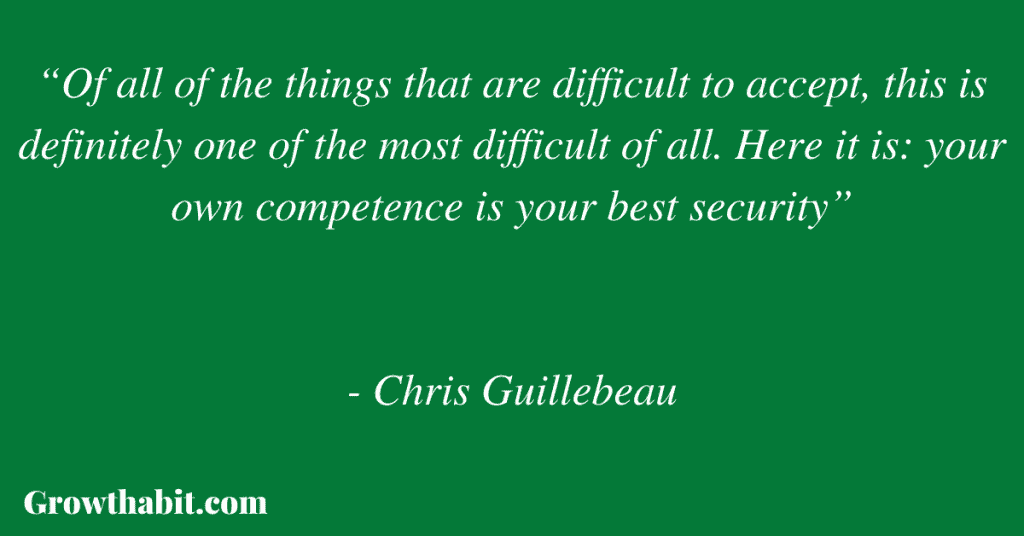
“What I do have is a history of survival through self employment, by any means necessary.”
“I’ve heard it said that an entrepreneur is someone who will work 24 hours a day for themselves to avoid working one hour a day for someone else.”
“The lesson I learned was that you can come back from anything. Even if your supplier disappears off the map and you are 5,000 miles away, a creative entrepreneur has to be able to patch things together somehow. No one else can bear the blame, or the responsibility for the comeback.”
“Don’t just escape from something; escape to something”
CHAPTER 6 – Graduate School vs. the Blogosphere
“Some people get an education without going to college; the rest get it after they get out. —MARK TWAIN”
“My undergraduate career was relatively undistinguished, aside from two things. First, I skipped high school to go straight into college. I wasn’t a genius or kid wonder—I was just bored with high school and not good at following rules. After one disastrous year and one decent year where I was awarded the prize for “Most Improved Student,” I decided to consider the award as a diploma and just didn’t go back for the third or fourth year.”
“straight A’s for the major I would eventually stick with (Sociology), and several C’s and D’s from the classes I simply gave up on.”
“In a flurry of registration, I signed up for more and more classes each quarter—at the university, at the community college, at a second community college, and by correspondence with another university a few hours away. Taking as many as 40 credit hours one term, I graduated with two bachelor’s degrees right at the end of my second year. My friends from the brief time I had spent at high school were just completing their freshman year.”

“but I also don’t have any illusions that I learned much in the way of actual content from the courses. Instead, I learned how to bluff my way through exams, how to quickly memorize (and quickly forget), and how to make myself look good. These are important skills in college and life, no doubt, but they can also be a hindrance on creating anything of lasting value.”
“I was faced with a decision to either continue my education with the PhD program on the East Coast or stay in the Pacific Northwest and focus on writing. I chose the writing, and I’ll show you why here.”
“MA thesis was read by a grand total of three people. Each of them said nice things about it, but the audience was extremely limited. By contrast, an online manifesto I published around the same time was downloaded (and presumably read, or at least glanced at) by more than 100,000 people in the first six months of publication.”
“I also became a member of the LifeRemix network, a small group of personal development and productivity authors. Among others, the group includes popular sites by Gretchen Rubin (Happiness Project) and Leo Babauta (Zen Habits), which allows me to associate with some of the most widely recognized authors in my industry. Within the LifeRemix network, I have exactly 21 peers, nearly all of whom have become personal friends. Being in a group of 22, or even a group of 3,000, is a lot more influential than being in a group consisting of 9 percent of the U.S. population.”
CHAPTER 7 – The Power of Your Own Small Army
“The price of greatness is responsibility. —WINSTON CHURCHILL”
“Your message should be “Come join me. Be a part of something bigger than yourself. There are other people who see the world in a similar way.”
“Putting forward controversial opinions from time to time will also help you gain a following and filter out prospects who aren’t a good match. There’s an old joke about the president who asks for a one-armed economist because he is tired of his advisors giving their opinion and then saying, “Well, on the other hand.” The point is that refusing to present a real opinion is always the safe road. Instead, take the road of risk by taking a stand.”
“Perhaps most interestingly of all, the people known by your followers may end up being more helpful than the people you know directly. This is because of the social phenomenon known as the “strength of weak ties.”
“Strong Ties = People you know directly Weak Ties = People known to your network (friends of friends)”
“Cultural anthropologist Margaret Mead once said something that has been repeated in graduation ceremonies ever since: “Never doubt that a small group of thoughtful, committed citizens can change the world. Indeed, it is the only thing that ever has.”
CHAPTER 8 – The Personal Finance Journey
“To state the obvious, personal finance is personal. Just as you shouldn’t let anyone else determine your goals and values, you should also seek to maintain control over your own financial priorities. More than almost any other aspect of identity, if you don’t have clarity of purpose over how you view the role of money in your life, you’ll likely end up going along with what other people do.”
“The goal is to know where you fall on the money and happiness scale, so you can then plan your life accordingly.”
“1. I happily exchange money for things I truly value. 2. As much as possible, I don’t exchange money for things I don’t value. 3. All things being equal, I value life experiences more than physical possessions. 4. Investing in others is at least as important as my own long-term savings.”
“I’m adamantly opposed to exchanging money for things I don’t value. In my case, I don’t feel the need to have a car, and I purposely relocated to a city where public transit is affordable and reliable. I also spend only about $100 to $200 a year on new clothes.”
“My decision not to pay $2 to ride the bus home from an appointment one day doesn’t allow me to buy a $4,000 roundthe-world plane ticket.”
“What if you save for 40 years, putting off all kinds of opportunities, then get hit by a bus the day before retirement? Better to plan for the future while also living in the present.”

“For years I stated my preference for renting instead of owning a home, and it was clear from the conversations that I was almost always in the minority.”
“To get serious about saving, focus on increasing income more than cutting expenses. This is because cutting expenses is essentially a scarcity behavior, whereas increasing income is essentially an abundance behavior.”
“Instead of trying to accumulate wealth (all the money you have in an investment account), you think primarily about increasing and diversifying income.”
Hugh MacLeod, full-time artist and author of Ignore Everybody, explained it like this: “If you want to make a lot of people hate you, all you need to do is make a lot of money doing something you love.” You could also replace “make a lot of money” with a number of other phrases that reflect success: “… all you need to do is have a lot of fun …” “… all you need to do is help a lot of people …” “… all you need to do is be better than everyone else …”
“Their worldview comes from a perspective of scarcity, where winning and losing is viewed as a zero-sum game. Just because you’re winning does not require someone else to lose, but not everyone understands that.”
“People who possess self-confidence and focus are often labeled as arrogant by those who lack both qualities. According to the scarcity perspective, winners are viewed with suspicion because they “must have” taken something from someone else on their rise to the top. It’s easier to bring winners down a notch than it is to rise to their level.”
PART III The Power of Convergence
CHAPTER 9 – Radical Exclusion and the Quest for Abundance
“He identified what he really wanted and ordered his life around that.”
“Ambition is not a vice of little people. —MICHEL DE MONTAIGNE”
“convergence is the state of being where everything in our lives is in alignment.”
“To achieve convergence, two separate (but related) activities are required: saying goodbye to unnecessary tasks, obligations, and expectations—then welcoming in a wide range of other things that enrich our lives.”
“you’ll need to be fairly determined, because there will be no shortage of distractions that crop up every day. These distractions include: • The 3,000 marketing messages that most of us take in every day • Busywork given to you by others or that you create for yourself • Unnecessary obligations or responsibilities • Social norms and widely held beliefs about work and time (the belief that you must work a certain number of hours each day, for example—without considering what actually gets accomplished during that time)”
“Asking two questions—”Why should I do this?” and “What will happen if I don’t?”—will clarify a great many responsibilities for you.”
“I know that I probably can’t change their behavior, but there’s a chance they’ll influence me to be more negative than I’d like, just by my being around them.”
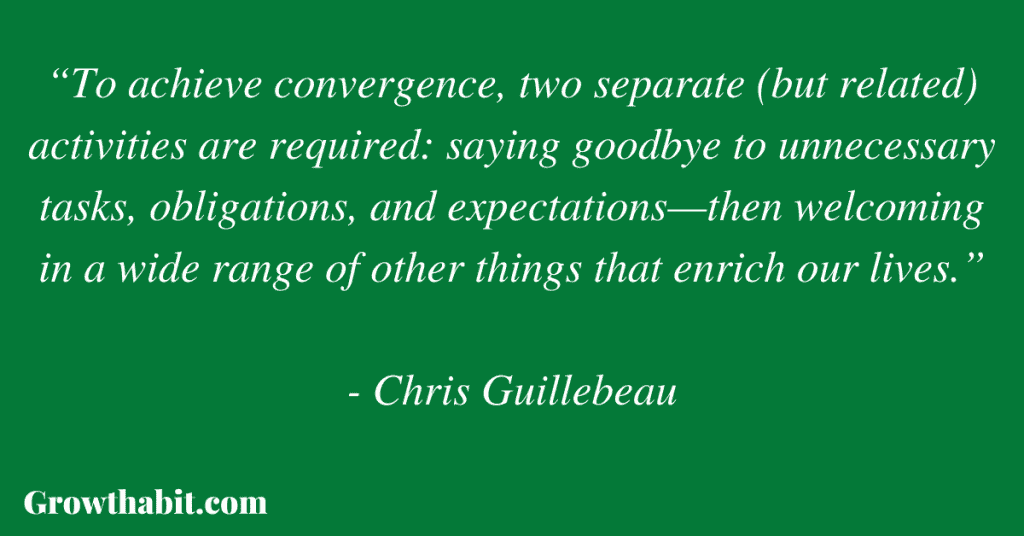
“At the end of the day, I want to be tired—not from a grind of tasks that leave me with a feeling of “What did I really do today?” but with a sense of wow.”
“The best moments in our lives are not the passive, receptive, relaxing times . . . the best moments usually occur when a person’s body or mind is stretched to its limits in a voluntary effort to accomplish something difficult and worthwhile.”
“Let’s embrace more of life, not less. Balanced people don’t change the world, and I’d rather spend my time feeling worn out from meaningful activities and projects.”
CHAPTER 10 – Contrarian Adventures
“Through travel I first became aware of the outside world; it was through travel that I found my own introspective way into becoming a part of it. —EUDORA WELTY”
“The trips were physically hard but emotionally stimulating. I was regularly asked for bribes, I learned to speak French while being detained at the presidential mansion in Guinea, and I had to fend off malarial mosquitoes while sleeping in missionary guesthouses on the beach at night. I didn’t love the mosquitoes, but everything else was enthralling”
“During the first year, I went to places as varied as Burma, Egypt, Kosovo, Moldova, and Uganda. The more I traveled, the more comfortable I became, and the more I learned about what I call “travel hacking”—my system of using round-the-world fares, a big stash of frequent flyer miles, and other tricks to bring the cost of my trips down to around $400 per flight anywhere in the world.”
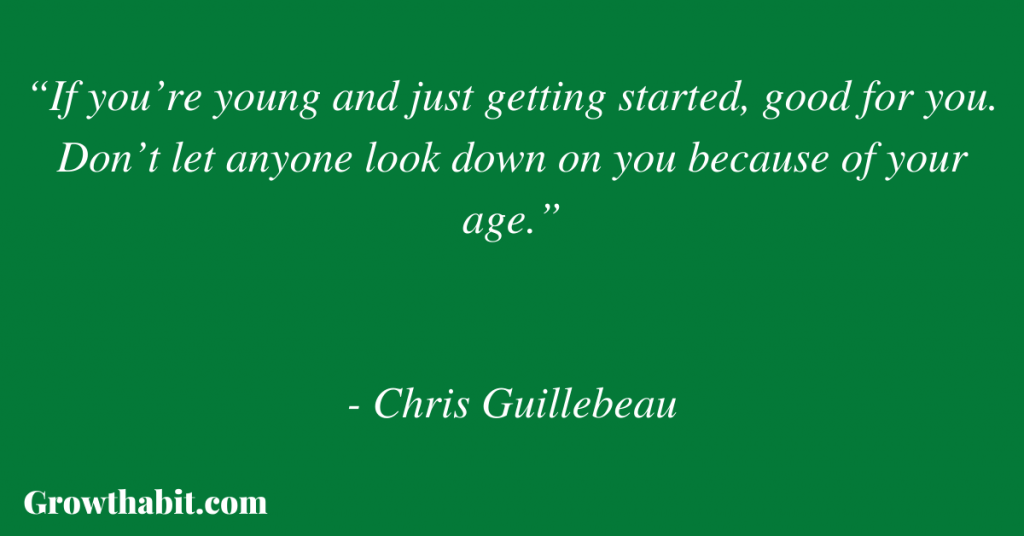
“My kind of travel is not about sightseeing or visiting museums. A lot of the questions I’m asked in travel interviews are rudimentary. What kind of backpack do I use? None. What’s the weirdest thing I’ve eaten? I’m vegetarian, so a lot of the “weird” things are off-limits for me. What’s my favorite country? I don’t have just one, but among others, I really like South Africa, Hong Kong, Macedonia, Jordan, and Chile.”
“Because I could be anywhere, I try to accommodate the other person’s schedule when working on a group project. In Kuwait I slept from midnight to 4 a.m., woke up for a conference call via Skype, then went for a run along the seashore before going back to bed for the rest of the morning. (If you’re going to run in Kuwait, where the temperature can be more than 120 degrees during the day, 4 a.m. is a good time to do it.)”
CHAPTER 11 – Your Legacy Starts Now
“There are certain things that are fundamental to human fulfillment. The essence of these needs is captured in the phrase “to live, to love, to learn, to leave a legacy.” The need to leave a legacy is our spiritual need to have a sense of meaning, purpose, personal congruence, and contribution. —STEPHEN COVEY”
“as I began my new life in Seattle, you’d hear about it within a few minutes of our introduction. Yes, I knew the president of Liberia, and did I mention that Desmond Tutu and I had coffee together one afternoon in Cape Town, South Africa? If not, I’d make sure you heard about it before too long.”
“many challenging and fulfilling experiences I had during that time. But I gradually came to realize that in a lot of ways, I’d have to leave that time behind and go on to something else.”
“But there comes another time, not too long after the glory days have ended, that we need to put them aside and move on to something else. If those life experiences were really so great, shouldn’t they provide the motivation for greater challenges? What could the future be like if we applied the lessons we learned and went on to something else that was even better?”
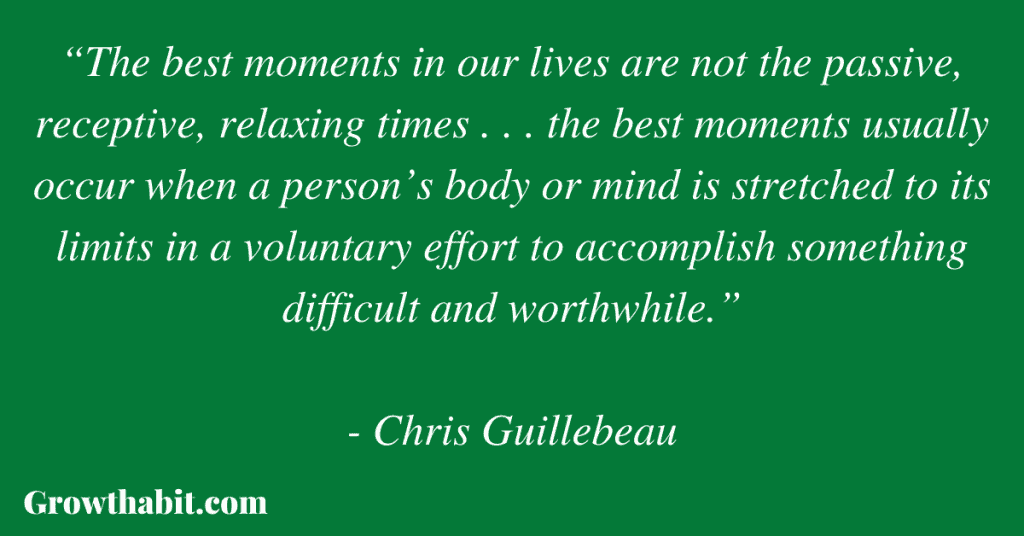
“Since my glory days were so transformative, I’d better make sure I find a way to have more of them somehow.”
“• Vision—how will the world be different because of the project? • Beneficiaries—who will benefit from the project? • Primary Method or Medium—how will you do the work? • Output—what will be produced as a result of your work? • Metrics—how will success be measured?”
“Create a continual metric for your most important work. In addition to the ongoing commitment to write for my blog readers, I write a newspaper column, weekly posts on several other sites, guest posts for other blogs, freelance articles for travel and business magazines, and lengthy reports that are for sale in my Unconventional Guides business.”
“Accounting for Sabbath days and occasional missed days, this allows me to generate an annual output of 300,000 written words—about 100 blog posts, 20 newspaper columns, 20 guest articles for various outlets, 3 information products, and 1 book each year.”
“If you’re young and just getting started, good for you. Don’t let anyone look down on you because of your age.”
CONCLUSION Dangerous Ideas
“Be daring, be different, be impractical, be anything that will assert integrity of purpose and imaginative vision against the play-it safers, the creatures of the commonplace, the slaves of the ordinary. —SIR CECIL BEATON”
“The ultimate measure of a man is not where he stands in moments of comfort and convenience, but where he stands at times of challenge and controversy. —MARTIN LUTHER KING JR.”
“Be daring, be different. In choosing to live a remarkable life, failure is a real possibility, but regrets are completely optional. If one plan doesn’t work out, you can try something else—but if you never try, you’ll go to your grave with your song still in you, as Henry David Thoreau wrote long ago. Be impractical. You don’t have to live your life the way other people expect you to. Most inventions were judged to be impractical at first glance. In the history of the world, provocative ideas that challenged authority were rarely welcomed by the people who controlled access to power and wealth. Assert integrity against the play-it-safers and slaves of the ordinary. The world has enough sleepwalkers and cynics; the rest of us need your help. I’ve made a lot of mistakes along the path of my own unconventional journey. What I have refused to do is settle, and I hope you won’t settle either. Taking the road less traveled is a good start, but you can also build your own road. I hope to see you out there when our roads intersect, somewhere, sometime. It’s your turn now.”
“Someone once unsubscribed from my blog and left a note that said, “Thanks for everything, but I need to go it alone now.” I don’t like losing readers, but I instinctively understood what that person meant.”
Book Review (Personal Opinion):
This is quite a good book that leads you through all the stages of creating your rules and living by them. Guillebeau doesn’t shy away from giving practical advice in his book because only announcing your rules to the world won’t do anything if you can’t back them up. The grade isn’t higher only because I’ve read so many other books before this on the same topic.
Rating: 7/10
This Book Is For (Recommend):
- A recent high-school graduate who is thinking about what to do in their lives
- A struggling entrepreneur who needs to find a new way
- Anyone who feels that they’re missing out on the most important things in their lives
If You Want To Learn More
Here’s Chris Guillebeau talking at Google about The Art of Non-Conformity.
Google Talks
How I’ve Implemented The Ideas From The Book
There’s a sentence at the beginning of the book that asks, “If everyone jumped from the bridge, would you do it?” followed by how when you grow up, people expect you to do what everyone else is doing (jump from the bridge). I’ve spent my entire life not jumping from the bridge and doing my own thing no matter what everyone else was saying and it has led me to some pretty crazy adventures.
One Small Actionable Step You Can Do
Reverse engineer your rule-competency model. Don’t create a rule and then try to get a skill to follow that rule. Instead, see what skills you already have and try to make a rule out of that.
